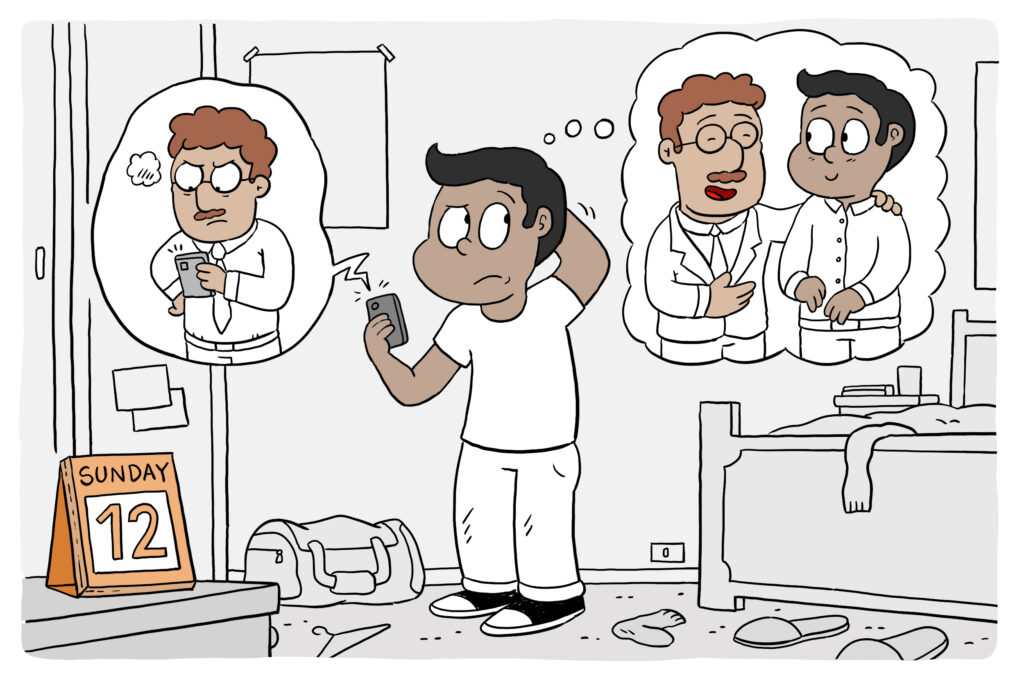
Manny started his first job in Haarlem full of passion and dedication. He is a salesman at a computer brand and deals with many nice entrepreneurs. He keeps them well informed about the progress of their order or other things he thinks are important to the customer. But now one of his Dutch customers, Frank, has informed him that he finds it annoying to send a Whatsapp on weekends.
Manny is surprised and worried. “Frank and I are in regular contact about how things are going. This weekend I was updating my administration in between, so I thought, ‘I’ll send him an app right away with an update!’ After which he reacted irritated, saying he’d rather not have me messaging him on weekends.” Manny just wanted to do his best. “But okay, he’s the boss! Still, I don’t understand how Dutch people get all the work done in those few hours they work. Then you can’t become successful, can you?”
Frank is happy to have Manny as a representative. Manny is very helpful and a friendly young man. He takes very good care of him and has helped him out a few times. But he also needs to know when to app and when not to app. “I felt like I had to set my limit last weekend when he sent me a WhatsApp in my spare time,” he said.
The connection
In the Philippines and many other countries, employees help you even on weekends, even if the business is closed. Work and personal life often intertwine. That’s why Manny thinks it’s perfectly normal to app his client on weekends.
For the Dutch, evenings and weekends are sacred. That’s why business apps wait until after the weekend – so someone doesn’t feel disturbed in their free time. Unless it is very important or unless agreements have been made about this.
Here we are dealing with that achievement orientation, that motivation for success. Private time is often secondary to work, although of course it shouldn’t get too crazy.
And also the hierarchy. Manny sees his customer as a kind of boss. The customer is king applies in more ways than one. He wants to be of service to him at all times. On top of that, he comes from a we society. Then you are not so concerned with time for yourself and contacts with every conceivable relationship are intermingled.
Frank can set clear boundaries. Manny finds that quite normal. He will only have trouble understanding why Dutch people so frenetically shield their leisure time, at least in Manny’s eyes.
He can learn to see the benefits of work-life balance! After all, this rule applies to everyone, so Manny will find that it can be quite pleasant to avoid thinking about work on the weekend in particular. And to realize that we can get a lot done during work if we are not distracted by private matters. We work to live, not the other way around.
In short
For Frank:
- Accept that Manny comes from a society that is performance-oriented and hierarchical.
- Frank is allowed to clearly state his boundaries. The customer is king.
- Giving explanations helps. Then Manny maintains his confidence and motivation.
- Be extra alert to the other person’s body language; Manny will not immediately express her surprise.
For Manny:
- Holland keeps private time and work time separate. Work to live, not the other way around.
- Ask the customer what they want if there are important messages on the weekend.
- The Dutch are used to being addressed directly.
- Don’t doubt your performance, it’s about very different things.
Want to read more about culture dimensions?
Important to know
This anecdote is based on stories shared with us. Connect2Us strives to highlight the dilemma from both sides and not to label people or suggest that one or the other should behave differently. Awareness by those involved is enough to move toward each other. Without pretending to be very different. Connect2Us aims to help readers recognize and avoid prejudice. Read about prejudice, discrimination and racism here.

